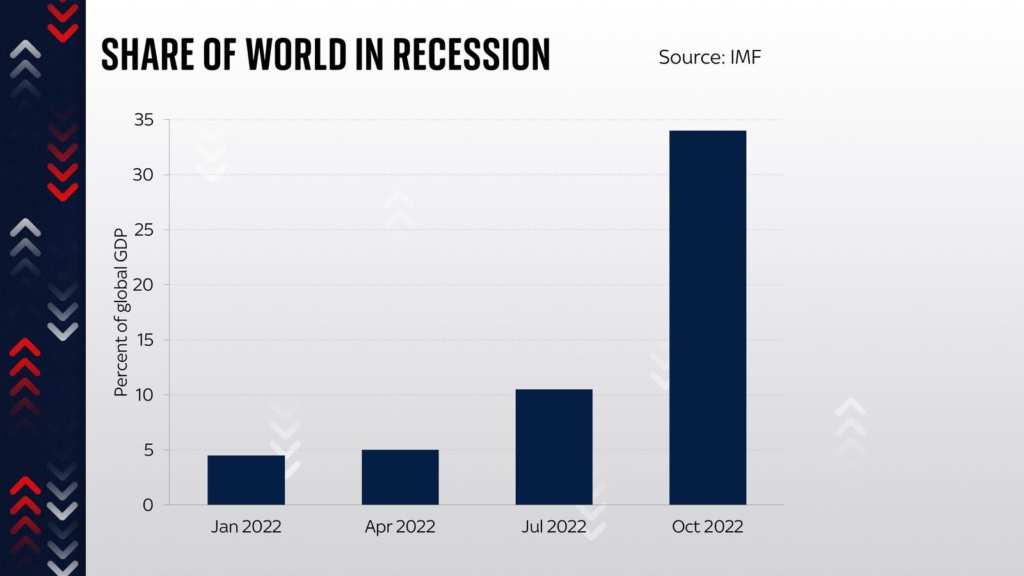The International Monetary Fund (IMF) has predicted a tough 2023 as it cut growth predictions and forecast economic contraction in a third of the world.
"The worst is yet to come," the global financial institution's World Economic Outlook report said.
"For many people 2023 will feel like a recession," it added.
A downward revision of the global growth rate for 2023, from the amount the IMF said it expected in July, has been made in the report.
Now, 2.7% growth is expected next year. It's down from the 6% growth experienced last year and the 3.2% growth forecast for this year.
This is the "weakest growth profile" since 2001, excluding the acute phase of COVID-19 pandemic and the global financial crisis, the IMF said.
It reflects "significant slowdowns" for the largest economies as America's gross domestic product (GDP) contracted in the first half of 2022, followed by the Euro area's contraction in the second half of 2022, and prolonged COVID-19 outbreaks and lockdowns in China with a growing property sector crisis.

"The world is in a volatile period: economic, geopolitical, and ecological changes all impact the global outlook," the report says.
While the IMF issued a warning to the UK, following the mini-budget market turmoil, this World Economic Outlook report was completed prior to the chancellor's mini-budget announcement, so does not reflect the ensuing market activity.
Nevertheless, IMF chief economist Pierre-Olivier Gourinchas told reporters that the government should ensure its tax and spending plans are in line with the Bank of England's inflation-fighting remit.
"Fiscal policy should be aligned with monetary policy," he said when asked about Britain's economic situation and the turmoil in its government bond market.
"Central banks are trying to tighten monetary policy, and if you have at the same time fiscal authorities that try to stimulate aggregate demand, it's like having a car with two people in the front... each trying to steer the car in a different direction. That's not going to work very well."
The future health of the global economy relies on the "successful calibration" of monetary policy, the course of the war in Ukraine, and the possibility of further pandemic-related supply-side disruptions, for example, in China.
Inflation could also continue to worsen as more energy and food price shocks cause it to persist for longer.
About a third of the world economy faces two consecutive quarters of negative growth, the IMF also forecast.
Latest Stories
-
Kurt Okraku took out my passport from the U23 squad that travelled to Japan – Najeeb Yakubu alleges
5 mins -
Where hope fails: Ghana’s decaying home for the destitute
15 mins -
NDC Mining Committee for 2024 campaign refutes allegations of recruiting thugs for elections
25 mins -
Traction Control: A lifesaver with an off switch? Here’s why it exists
28 mins -
I don’t need anyman to woo me with money – Miss Malaika 2024 winner refutes pimping claims
35 mins -
”Kurt Okraku sabotaged my national team career because I refused to sign with Dreams FC” – Najeeb Yakubu
36 mins -
Businesses urged to leverage Generative AI for enhanced customer engagement
40 mins -
MultiChoice Ghana partners with Ghana Hotels Association to elevate guest entertainment
48 mins -
Bawumia’s music streaming app or Mahama’s pay-per-view TV channel?
53 mins -
Karpowership Ghana empowers 40 Takoradi Technical University students with scholarship
55 mins -
We expect significant reduction in prices of petroleum products in coming weeks – CEO AOMC
1 hour -
Betway Africa offers once-in-a-lifetime ‘Play-on-the-Pitch’ experience at Emirates Stadium
1 hour -
I coined the term ‘hype man’ in Ghana – Merqury Quaye
1 hour -
Vasseur questions ‘strange momentum’ of Formula One race director change
2 hours -
“I am disappointed in Kojo Manuel” – Merqury Quaye on “no tie” comment
2 hours

